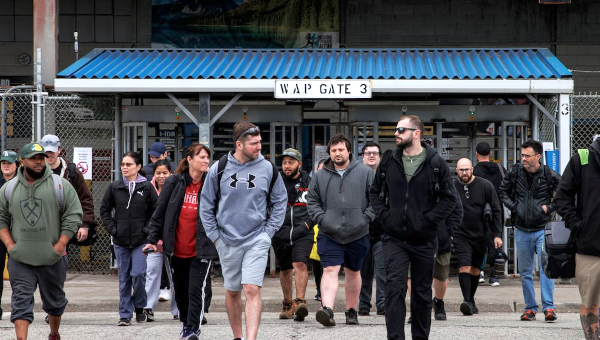Renewing Democracy in Ontario From the Top Down
Throughout Canada, as in much of the world, there has been a marked decline in voter turnout over the past twenty years. This general though uneven trend cuts across class, gender, racial, age and regional lines. Political elites began to pose the question a few years ago as to the degree to which this threatened the very legitimacy of the political institutions serving to manage and organize capitalism – that in fact this decline in participation may be eroding beyond the point of retrieval. The response has been, again, quite uneven across countries. But in Canada, from PEI to BC, governments of all shades have been talking about ‘engaging citizens’ and ‘democratic renewal.’ Upon forming a government in the Fall of 2003, Ontario’s Liberal McGuinty government established a Democratic Renewal Secretariat to spearhead the process of deepening and expanding democracy in Ontario. What has this meant and should the ‘broad left’ care? Well, of course, we should care. It is one of the few opportunities in public institutions to even pose the question, at least in limited form, of whether this is really the democracy we want and, in fact, desperately need?
As a component of the Ontario renewal process, the Ontario Citizen’s Assembly has begun to work on reviewing – and will
ultimately propose changes for – how the electoral system works. Its mandate suggests how limited the conceptions of democracy is in the neoliberal horizons of today. In addition, the process the Assembly has embarked upon is so fundamentally exclusionary that one cannot help but wonder, what is this really about. This is not exactly what one might think of as a democratization project with democracy and citizen engagement
as its foremost objects. With the media virtually ignoring this process, some closer scrutiny of the Ontario Democratic Renewal agenda and some basic issues of even minimal democratization are warranted.
Democratic Renewal in Ontario: What’s Happened So Far?
Before unpacking what this is and what it is not, let’s review what the democratic renewal project, as conceived by the McGuinty Government, has achieved to date. In 2003 and 2004, the McGuinty government introduced various pieces of legislation in the name of democratic renewal to do the following: Hydro One and Ontario Power Generation would now have to disclose the names and salaries of all employees earning more than 100 K per year; similarly, freedom of information legislation was changed to apply to Hydro as well; Cabinet ministers would be required to attend two-thirds of Question Periods in the Legislature; the Provincial Auditor’s powers were expanded to cover the broader public sector meaning hospitals, school boards, universities, and government corporations, and partisan government advertising was banned. Little of this received attention and, notwithstanding the merit in some of these ‘reforms,’ one can see why. Are you feeling engaged yet? No? Well, for the most part this is all the stuff of basic accountable government – what governments should minimally be doing. It’s hardly the stuff of an expanding and deepening democracy. But then, it’s not meant to be.
The media gave much more profile to the fixed election date legislation introduced in late 2005 which establishes that Ontario elections will take place every four years sharp. This curtails the power of the premier to tinker with when to dissolve the Legislature. But as with the administrative changes, it is all very much based in the practices within the environment of the existing Legislature and its representative forms. A place most Ontarians have never been to, and feel alienated from.
The Ontario Citizens’ Assembly: Expanding Democracy or Limiting the Vision?
Somewhat more interesting were amendments made to the Elections Act in 2005 which gave Elections Ontario, the institution which manages the electoral process and party financing in Ontario, with the power to select volunteers to sit on a Citizens’ Jury on Political Finance Reform and a Citizen’s Assembly on Electoral Reform. The Citizen’s Assembly is the most intriguing as its mandate is to “consider how Ontarians elect their representatives. The Assembly may recommend a different electoral system from our current first-past-the-post system, in which case the government will hold a referendum on that alternative within its current mandate.” Any recommendation for change will be put to a province-wide referendum in October 2007. This Assembly, chosen over the spring and summer of 2006, is composed of 103 individuals, one from each constituency.
The process of determining this final 103 from an initial random call, based on the voters list, of 12,000 citizens is worth further exploration given the numbers of persons who would have been excluded from the voters list or not reachable due to residence relocation, homelessness, citizenship status etc. And, the fact that, a large numbers of those initially screened in, when invited, declined due to lack of interest and/or resources such as time, language, and the simple certain level of confidence required to participate in such a process. A socio-economic profile of these special 103 would perhaps be revealing given how resource intensive participation in the assembly must be. It is hard to imagine a logger, retail worker, autoworker, administrative assistant or teacher for that matter being in a position to heed such an invitation even if one were highly interested.
While the agenda of the assembly is richer than simply the mechanics of electing legislative representatives, it is the issue of elections which really is at the heart of the project. Which electoral model to recommend is what the assembly will deliberate – status, quo, pure proportional representation or some other variation such as the single-transferable vote. All heady stuff. And not unimportant. But the diagnosis says citizens are disengaged from liberal democracy and the remedy is to re-engage them via electoral reform. How much water does this carry? But what if the popular disengagement from and apathy with liberal democracy is more complex and deeper-seated in the broader institutions of capitalism than what a redesigned electoral system can correct?
This brings us back to the very limited scope of the democratic renewal process in Ontario. It is focused on the internal functioning of the Legislature and, perhaps, some renovation of the electoral machinery. It speaks nothing of the lack of time and other resources needed to fully participate in political life and activity and more crucially it says nothing about the diminished role and therefore meaning of the state and public sector in the everyday lived lives of so many people. The 103 members of the Assembly have been spending 6 weekends from September to December 2006 learning about electoral systems. Nice work if you can get it…and have the time. Again, there’s a disconnect here.
So, what is at the root of political apathy, disengagement, and significant voter indifference? Not having political choices available which reflect the full-range of issues and values in society is a significant aspect. Jurisdictions which employ some form of proportional representation tend to have healthier voter turnout for elections and this must in part be due to a wider spectrum of political voices able to gain access to representative institutions. There are exceptions to this however. The Citizens’ Assembly will study proportional representation models and perhaps make a recommendation on a different electoral model. The scuttlebutt is that there is some preference to see Ontario constituencies recast as multi-member seats elected through a single transferable vote (STV) model. (And that is if any change at all is to be suggested, and many political elites in Ontario are against any change at all.) The STV system can be complex and therefore the mechanics of arriving at a ‘winner’ is not obvious. The British Columbia Citizens’ Assembly recommended such a system last year and it was defeated in the subsequent provincial referendum by not gaining the ‘super-majority’ necessary for it to pass. But the exact recommendation and the details are still some distance away.
Looked at comparatively, there is a relatively high correspondence between jurisdictions where there is a robust and meaningful public sector which delivers a significant range of public goods and services such as comprehensive health care, education, housing, social security etc. and comparatively high levels of voter turnout. Jurisdictions with more anemic provision of public services tend toward the lower end of participation. Interestingly, neither the Citizens’ Assembly nor the Democratic Renewal Secretariat is looking at how to make the public sector more meaningful to the lives of Ontarians. Relatedly, why does the Democratic Renewal initiative not consider new forms of accountability to the producers and consumers of public services through the extension direct participatory processes in public planning and delivery? Rather than accountability to citizens and workers, the entire debate about accountability has been structured around neoliberal principles of limited expenditures, and making ministers and senior public managers accountable for individual careers.
It’s also been demonstrated that political knowledge is a key element in determining if one is going to participate in the process. If the government is really interested in engaging citizens and reversing the decline in voter participation why not provide the structures and resources to deepen the awareness and knowledge of political issues throughout Ontario society rather than only expending efforts on bringing a special 103 individuals up to speed.
A Minimal Real Democracy Agenda
The Ontario Democratic Renewal process is incredibly truncated in terms of its agenda, its penetration of the failings of contemporary democracy and its horizons of what is possible and even what is immediately necessary. Let’s face it, a real democratic renewal process interested in renovating liberal representative institutions would at least have to provide at the minimum the following.
1) Meaningful Electoral Reform
Ontario requires a Proportional Representation model which includes a direct link between votes received and the allocation of legislative representatives. This will ensure small parties have some chance of gaining voice in the election process and in the Legislative Assembly. Moreover, it will likely, though not necessarily, ensure that no party can win a majority of seats without winning a majority of the vote. Consequently, any cabinet would be required to include representatives of other political groupings or at the very least work closely with the opposition parties.
2) Expanding Democracy in Ontario’s Political and Public Service Institutions
a) The first order of duty is to abolish monarchical and colonial symbols. These are not just quaint historical legacies, they in fact help shape and constrain political processes and culture within the Ontario state and Ontario society.
b) Establish a democratic accountability framework which would ensure ministers and senior public managers in the public service are responsive to citizens as producers of public services and as users of those same services. Currently the accountability regime is strictly hierarchical and highly centralized. In short, if you want to climb the career ladder, you better follow the direction of those above you. Therefore a new forum – a Public Services Producers and Users Council – is to be established where those who deliver the services – the workers – and those who use them – the citizens – can make recommendations on how to make the system better and monitor the progress in making those changes. This could be extended into forms of popular budgeting and planning across ministries.
c) Access to information held by government is critical. Existing freedom of information laws are not designed to allow for genuine access. In fact, they are designed to control access. It’s vitally important that citizens’ have access to the myriad of documents produced within the state which reveal what options were considered and why in making policy decisions, in the awarding of contracts, and in the hiring of public servants.
3) Expanding Democracy In Our Lived Lives
a) To meaningfully participate in political life requires time. Working people and their families know this is a rare resource. However, to become involved in a political party or organization, community group, union, or movement requires that a person have the time to do so. Any meaningful democratization project must address this. A minimum step would be to legislatively reduce maximum working hour to 35 hours/week with no loss in pay and to expand vacation entitlements and rights to take short-term leaves with a guaranteed right to return to work
b) Related to the general question of time is the necessity for universal day care. This is crucial if anyone is serious about a greater role for women in political life.
c) Bringing democracy into the workplace where most of us spend a great deal, and growing amount of time, is essential. Workplace councils are required to provide working people with the power to make crucial decisions respecting health and safety, regulating the number of hours worked, coordinating applications for leaves, and as a forum in which to increase political learning within the workplace. Necessarily workplace councils would only be effective if they are based upon the presence of a recognized trade union bargaining agent. If one is not present, steps to ensure such representation must be taken.
d) Participation requires a minimum level of income therefore establishing a living wage policy so that individuals have at least some financial resources beyond the minimum is again a prerequisite to deepening democracy.
This agenda, even when limited to largely formal representative institutions, would advance some progressive issues for the Left and open some political space to contest even more. It would still be a long way from advancing popular forms of democracy associated with the socialist project. But the long and short of it is that, in this period of neoliberalism and a disorganized Left incapable of challenging for power even minimally, Ontario’s democratic renewal project has been defined so narrowly that the objective of renewing democracy may very well result in a further erosion in the legitimacy of the limited version of democracy which currently exists. The minimum program proposed here is not revolutionary in the slightest and can easily be implemented…if the will and desire for genuine democratic renewal was there. •





